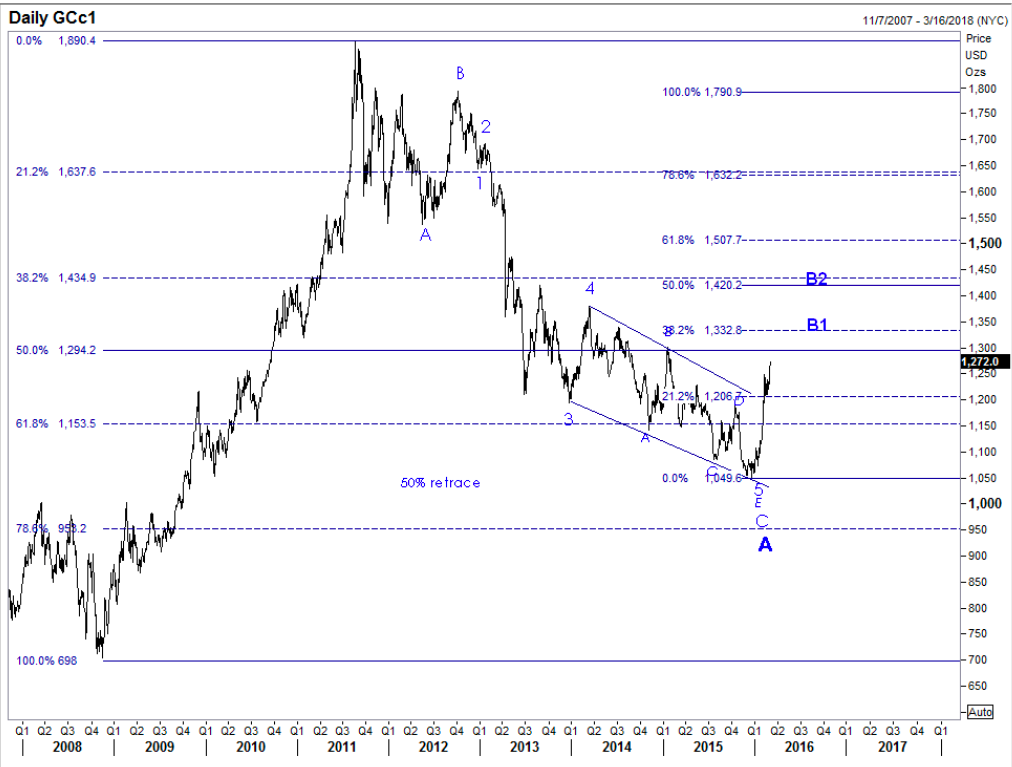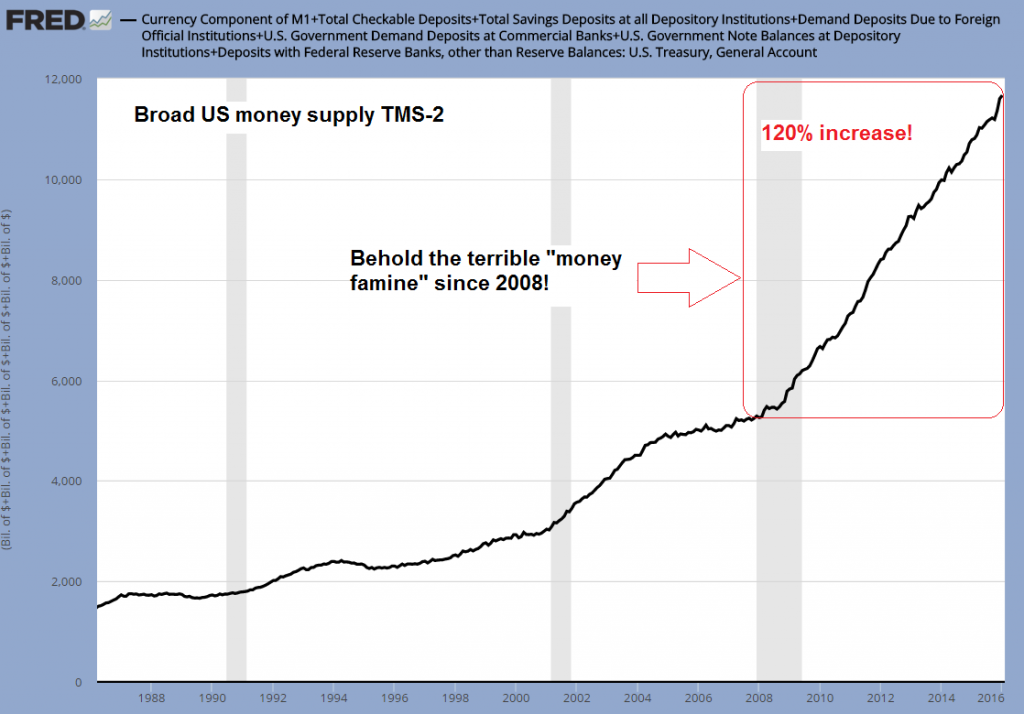Currency
 Just stunning.
Just stunning.
German newspaper Der Spiegel reported yesterday that the Bavarian Banking Association has recommended that its member banks start stockpiling PHYSICAL CASH.
Europe, of course, has been battling with negative interest rates for quite some time.
What this means is that commercial banks are being charged interest for holding wholesale deposits at the European Central Bank.
In order to generate artificial economic growth, the ECB wants banks to make as many loans as possible, no matter how stupid or idiotic.
They believe that economic growth is simply a function of loans. The more money that’s loaned out, the more the economy will grow.
This is the sort of theory that works really well in an economic textbook. But it doesn’t work so well in a history textbook.
Cheap money encourages risky behavior. It gives banks an incentive to give ‘no money down’ loans to homeless people with no employment history.
It creates bubbles (like the housing bubble from 10 years ago), and ultimately, financial panics (like the banking crisis from 8 years ago).
Banks are supposed to be conservative, responsible managers of other people’s money.
When central bank policies penalize that practice, bad things tend to happen.
Traditionally when a commercial bank in Europe wants to play it safe with its customers’ funds, they would hold excess reserves on deposit with the European Central Bank.
In the past, they might even have been paid interest on those excess reserves as an extra incentive to be conservative.
Now it’s the exact opposite. If a bank holds excess reserves on deposit at the ECB to ensure that they have a greater margin of safety, they must now pay 0.3% to the ECB.
That’s what it means to have negative interest rates. And for the bank, this eats into their profits, especially when they have tens of billions in excess reserves.
Talk about being between a rock and a hard place.
On one hand, banks stand to lose a ton of money in negative interest. On the other hand, they put their customers’ deposits at risk if they don’t hold extra reserves.
Well, the Bavarian Banking Association has had enough of this financial dictatorship.
Their new recommendation is for all member banks to ditch the ECB and instead start keeping their excess reserves in physical cash, stored in their own bank vaults.
This is officially an all-out revolution of the financial system where banks are now actively rebelling against the central bank.
(What’s even more amazing is that this concept of traditional banking– holding physical cash in a bank vault– is now considered revolutionary and radical.)
There’s just one teensy tiny problem: there simply is not enough physical cash in the entire financial system to support even a tiny fraction of the demand.
Total bank deposits exceed trillions of euros. Physical cash constitutes just a small percentage of that sum.
So if German banks do start hoarding physical currency, there won’t be any left in the financial system.
This will force the ECB to choose between two options:
1) Support this rebellion and authorize the issuance of more physical cash; or
2) Impose capital controls.
Given that just two weeks ago the President of the ECB spoke about the possibility of banning some higher denomination cash notes, it’s not hard to figure out what’s going to happen next.
Neither this email nor content posted on the website SovereignMan.com is intended to provide personal tax or financial advice. Before undertaking any action described in this letter, financial or otherwise, you should discuss your options with a qualified advisor– tax accountant, financial planner, attorney, priest, IRS auditor, Bernie Madoff, et
If you’d like to update your email address or no longer wish to receive our daily emails, click the link below: Update email or unsubscribe
Publisher of Sovereign Man
30 Cecil Street #19-08
Singapore, Singapore – No State 049712
Singapore
 Well, all eyes on US Non-farm Payroll report today. Expected is +193k; previous month +158k…
Well, all eyes on US Non-farm Payroll report today. Expected is +193k; previous month +158k…
The pack mixed, starting to square up in front of the report; bonds flat, only slightly higher; but gold up again….hmmm…next resistance at 1294-1332; then 1420-1434…gold daily below:

 Way back in 1998, before the euro even got off the ground, I told everyone I could that the currency wouldn’t last. At best, I said, it would last until the year 2020.
Way back in 1998, before the euro even got off the ground, I told everyone I could that the currency wouldn’t last. At best, I said, it would last until the year 2020.
Few believed me. Many said I was nuts. After all, how could I make such a definite longer-term forecast, especially involving a region of the world that then, and now, still represents the second-largest economic region in the world?
Well, forecasting that the euro would fail was simple: It wasn’t put together properly in the first place. It didn’t stand a chance to survive long-term and still doesn’t.
The architects of the euro — if you can call them that — didn’t have a clue as to what it takes to have a single currency. They just believed one size fits all. But oh, how very foolish, yet typical of leaders anywhere.
Fact: Although the European Central Bank (ECB) was created, each individual country’s former national or central bank was kept in place, with virtually all the powers it had previously.
In other words, the Bank of Italy, for instance, could create its own interest rate policy, set rates, itself, and yes, even print euros if desired.
Imagine that. It would be as if each of the 50 states in the U.S. had their own central bank that could decide its own interest rate policy and print dollars whenever it wanted.
Fact: Euro-planners also never set up a federal debt market. Instead, they figured the existing debts of the individual countries would suffice. No need to convert them to a national or federal debt. No need to unify anything. Just let those debts be.
Insane. What that did was create a potpourri of debts. Worse, underperforming countries could see their debts swing wildly in value as the new currency started to trade. No stability whatsoever.
And, it allowed other countries, such as Greece, to borrow oodles of euros at the low rates of another country when, in reality, its credit rating didn’t deserve such low rates.
To make another analogy, that would be as if the U.S. had no Treasury market whatsoever, and instead, relied on the debts of states as diverse as Mississippi and California as a kind of national debt market.
Fact: As a Continent, Europe is composed of almost 50 countries, each with its own language, own culture and own history. And some countries in Europe have even more than one national language.
So is there a common language in Europe so all Europeans can talk to each other? No, there isn’t.
Is there a common background of some sort that would unite them? No, there isn’t and never has been.
Is there a common future goal that would unite them? You might say an economic union would, which is what the designers of the euro had in mind. A United States of Europe so to speak. A peaceful, united Continent that could avoid the untold scores of wars that have plagued Europe throughout the millennia.
And that is certainly a nice goal or dream to have. But unless you put the infrastructure in place to make a real economic union, with sensitivity and empathy to all the different players and cultures involved …
Such an economic union doesn’t have a snowball’s chance in hell of a surviving.
And indeed, that brings us to today, where now, the euro is finally cracking the last vestiges of important, long-term support.
The currency has already plunged from a monthly high of 1.6028 in July 2008 to 1.08826 as I pen this issue. That’s a humongous plunge of 32.08% in the past eight years, a record decline for a supposed major currency.

And now, as you can see from my latest cyclic forecast chart, the euro’s plunge is about to get a whole lot worse.
The currency has just cracked important support at the 1.0900 level.
It should now fall to the 1.0500 level, then 1.0300 then to 1.000 …
And ultimately, far lower, ceasing to exist at all by the year 2020.
What’s worse are the geopolitical ramifications. What was meant to unite Europe will end up causing the opposite: More and more civil protests … more and more discontent … more revolutionary actions … secessions … anti-Semitism and more, including bloodshed.
For you see, it’s the grand experiments of harebrained politicians that are always the root cause of discontent. They endlessly tinker with the likes of you and me, with the economy, with things they don’t have a clue about …
Until the whole house of cards comes crashing down.
My view: Kiss the euro goodbye. Avoid doing business in the euro at all costs. Stay in U.S. dollars. Invest in U.S. dollars, trade in U.S. dollars.
Best wishes,
Larry
From Crazy to Crazier
Considering how often “helicopter money” has been mentioned in the mainstream financial press of late, it is probably going to be on the agenda fairly soon. The always dependable Martin Wolf at the FT – who has never seen a printing press he didn’t think could solve all our economic problems – has come out forcefully in favor of the idea. See for instance his recent screed “The case for helicopter money”, followed by the promise – or rather, the threat – that “Helicopter drops might not be far away”.

 Well, it’s clear to me. If you look at the world over the last 100 years, you have a group of people that want to have more and more control over you and me. They want to know where you are, what you do, what you’re looking at. Basically, we’re moving into an Orwellian society where they can check everything. And cash will still be one of the means where you could go somewhere and buy something and nobody would really know about it. Now they want to abolish it. Of course…
Well, it’s clear to me. If you look at the world over the last 100 years, you have a group of people that want to have more and more control over you and me. They want to know where you are, what you do, what you’re looking at. Basically, we’re moving into an Orwellian society where they can check everything. And cash will still be one of the means where you could go somewhere and buy something and nobody would really know about it. Now they want to abolish it. Of course…















